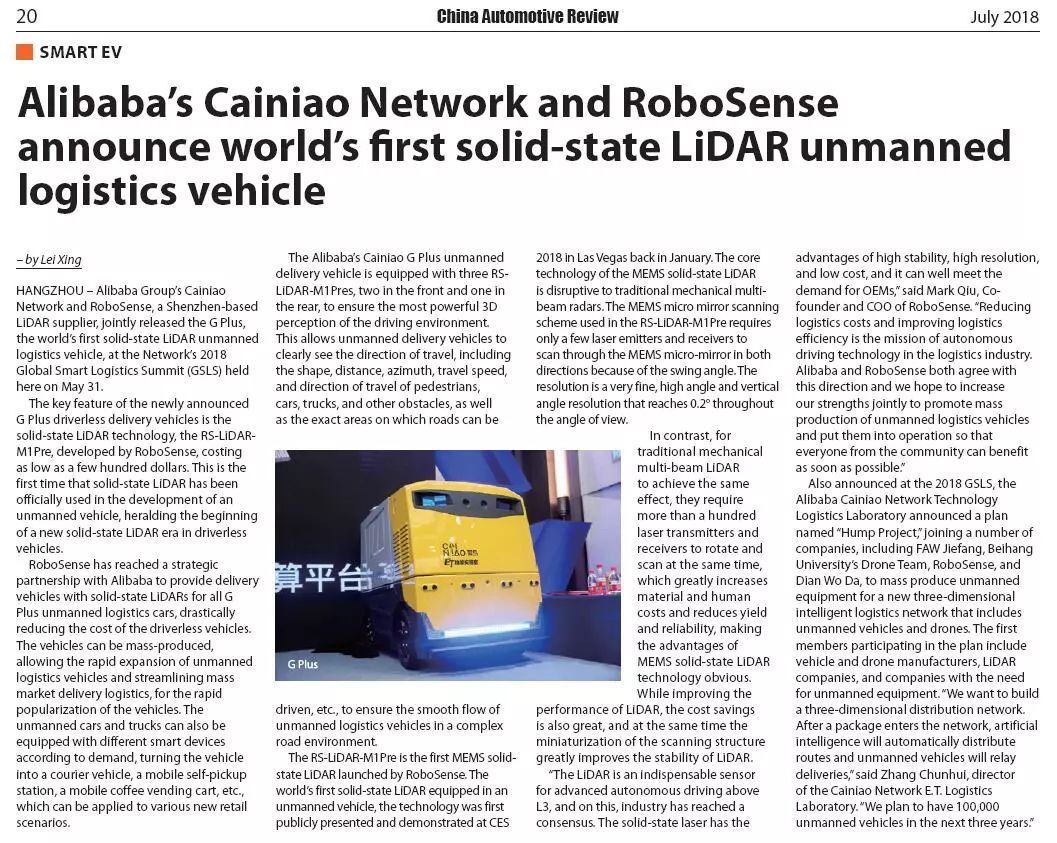HANGZHOU – Alibaba Group's Cainiao Network and RoboSense, a Shenzhen-based LiDAR supplier, jointly released the G Plus, the world's first solid-state LiDAR unmanned logistics vehicle, at the Network's 2018 Global Smart Logistics Summit (GSLS) held here on May 31.

The key feature of the newly announced G Plus driverless delivery vehicles is the solid-state LiDAR technology, the RS-LiDAR-M1Pre, developed by RoboSense, costing as low as a few hundred dollars. This is the first time that solid-state LiDAR has been officially used in the development of an unmanned vehicle, heralding the beginning of a new solid-state LiDAR era in driverless vehicles.
RoboSense has reached a strategic partnership with Alibaba to provide delivery vehicles with solid-state LiDARs for all G Plus unmanned logistics cars, drastically reducing the cost of the driverless vehicles. The vehicles can be mass-produced, allowing the rapid expansion of unmanned logistics vehicles and streamlining mass market delivery logistics, for the rapid popularization of the vehicles. The unmanned cars and trucks can also be equipped with different smart devices according to demand, turning the vehicle into a courier vehicle, a mobile self-pickup station, a mobile coffee vending cart, etc., which can be applied to various new retail scenarios.

The Alibaba's Cainiao G Plus unmanned delivery vehicle is equipped with three RS-LiDAR-M1Pres, two in the front and one in the rear, to ensure the most powerful 3D perception of the driving environment. This allows unmanned delivery vehicles to clearly see the direction of travel, including the shape, distance, azimuth, travel speed, and direction of travel of pedestrians, cars, trucks, and other obstacles, as well as the exact areas on which roads can be driven, etc., to ensure the smooth flow of unmanned logistics vehicles in a complex road environment.
The RS-LiDAR-M1Pre is the first MEMS solid-state LiDAR launched by RoboSense. The world's first solid-state LiDAR equipped in an unmanned vehicle, the technology was first publicly presented and demonstrated at CES 2018 in Las Vegas back in January. The core technology of the MEMS solid-state LiDAR is disruptive to traditional mechanical multi-beam radars. The MEMS micro mirror scanning scheme used in the RS-LiDAR-M1Pre requires only a few laser emitters and receivers to scan through the MEMS micro-mirror in both directions because of the swing angle. The resolution is a very fine, high angle and vertical angle resolution that reaches 0.2° throughout the angle of view.

In contrast, for traditional mechanical multi-beam LiDAR to achieve the same effect, they require more than a hundred laser transmitters and receivers to rotate and scan at the same time, which greatly increases material and human costs and reduces yield and reliability, making the advantages of MEMS solid-state LiDAR technology obvious. While improving the performance of LiDAR, the cost savings is also great, and at the same time the miniaturization of the scanning structure greatly improves the stability of LiDAR.
"The LiDAR is an indispensable sensor for advanced autonomous driving above L3, and on this, industry has reached a consensus. The solid-state laser has the advantages of high stability, high resolution, and low cost, and it can well meet the demand for OEMs," said Mark Qiu, Co-founder and COO of RoboSense. "Reducing logistics costs and improving logistics efficiency is the mission of autonomous driving technology in the logistics industry. Alibaba and RoboSense both agree with this direction and we hope to increase our strengths jointly to promote mass production of unmanned logistics vehicles and put them into operation so that everyone from the community can benefit as soon as possible."
Also announced at the 2018 GSLS, the Alibaba Cainiao Network Technology Logistics Laboratory announced a plan named "Hump Project," joining a number of companies, including FAW Jiefang, Beihang University's Drone Team, RoboSense, and Dian Wo Da, to mass produce unmanned equipment for a new three-dimensional intelligent logistics network that includes unmanned vehicles and drones. The first members participating in the plan include vehicle and drone manufacturers, LiDAR companies, and companies with the need for unmanned equipment. "We want to build a three-dimensional distribution network. After a package enters the network, artificial intelligence will automatically distribute routes and unmanned vehicles will relay deliveries," said Zhang Chunhui, director of the Cainiao Network E.T. Logistics Laboratory. "We plan to have 100,000 unmanned vehicles in the next three years."
延伸阅读:中文版
全球首款固态激光雷达无人物流车G Plus发布,速腾聚创保驾护航

©本刊所有图片、文字及版式版权均为【中国汽车要闻】(China Business Update)所有,未经授权许可,不得复制或用作其它商业用途,其他网站及平面媒体如需转载,须注明作者及出处。